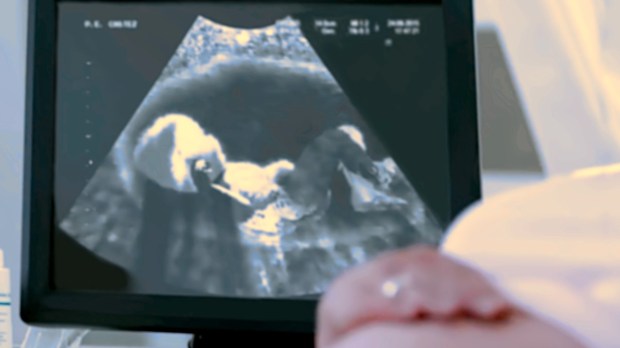Most expectant parents eagerly look forward to seeing their baby wriggling and kicking on the ultrasound screen, but for many parents, these routine scans bring distress instead of joy.
In the United States alone, up to 3% of pregnancies are complicated by a potentially life-limiting fetal diagnosis, shattering parents as they reimagine the life they expected with their baby.
These parents can find much needed support in perinatal hospice, an innovative and compassionate model of support for parents who choose to continue pregnancies following a prenatal diagnosis indicating that their baby has a life-limiting condition and might die before or shortly after birth.
One doctor, Elvira Parravicini, MD, has walked beside hundreds of these parents. A perinatologist/neonatologist, Parravicini is Associate Professor of Pediatrics at Columbia University Medical Center, but she’s best known as the Director of the Neonatal Comfort Care Program.
Dr. Parravicini’s heroic efforts to welcome and cherish every precious life, no matter how short, earned her the 2024 Notre Dame Evangelium Vitae Medal.
But beyond any award, the true measure of her success is the families she’s helped, as she brings comfort and peace to grieving parents and ensures that their little babies have the best possible care in the most challenging of conditions.

Dr. Parravicini shared with Aleteia some of what she’s learned over the years. If you or someone you love is facing a difficult prenatal diagnosis, her wisdom may guide your next steps on this journey.
Where can you find support?
1
Perinatal hospice resources
She strongly recommends the website perinatalhospice.org as a comprehensive guide. The site lists centers for perinatal hospice all over the world, and also assures parents that this support is possible even if none of those locations are near:
Perinatal hospice is not a place. It is a model of care and an extra layer of support. Although having an established perinatal palliative care team is ideal, even without one it’s possible to create a perinatal hospice experience for you and your baby.
2
Advocate with information
If perinatal palliative care isn’t familiar to the medical providers, parents may need to advocate and share what they’ve learned with their doctors. It helps to be prepared and aware this may happen, and you can find resources at the site she shared.
3
Make an informed plan
Parravicini offers her expertise and that of her team for consultation. Parents can reach out to her for advice on putting together a care plan based on their particular circumstances.
Her consultations are also very helpful for communicating and planning with the family’s own medical providers. Medical providers interested in learning more can attend training and conferences with Parravicini’s program.
The surprising moments of joy
One thing about her work consistently surprises people: Working in perinatal hospice brings many moments of joy and celebration. The perinatal hospice website puts it this way:
Continuing the pregnancy is not about passively waiting for death. It is about actively embracing the brief, shining moment of this little life.
Dr. Parravicini explained, “In a Comfort Care program, life may be short, but it is something that is already a big celebration.”
The birth is often a celebration, she said. Many parents feel happy to be able to meet their baby, and they cherish and celebrate the brief time they have together.
This surprising joy was what Maria and Joe Keller experienced when they faced a life-limiting prenatal diagnosis for their beloved son. “The only thing this little boy experienced was love, a ton of love,” Maria Keller said. “Every moment of his life was filled with the love of a lifetime.”
Other parents report the same phenomenon, and you can read about their experiences in the parent voices section of the perinatal hospice site. Some research also indicates that choosing palliative care for newborns assists in the parents’ grieving process.
These surprising moments of joy are not what one would expect, but perhaps parents can find comfort and courage in knowing that joy and peace are possible in deep grief.
If you are seeking perinatal palliative care, Dr. Parravicini’s groundbreaking work may help you navigate this hard road with the compassion your family deserves.



